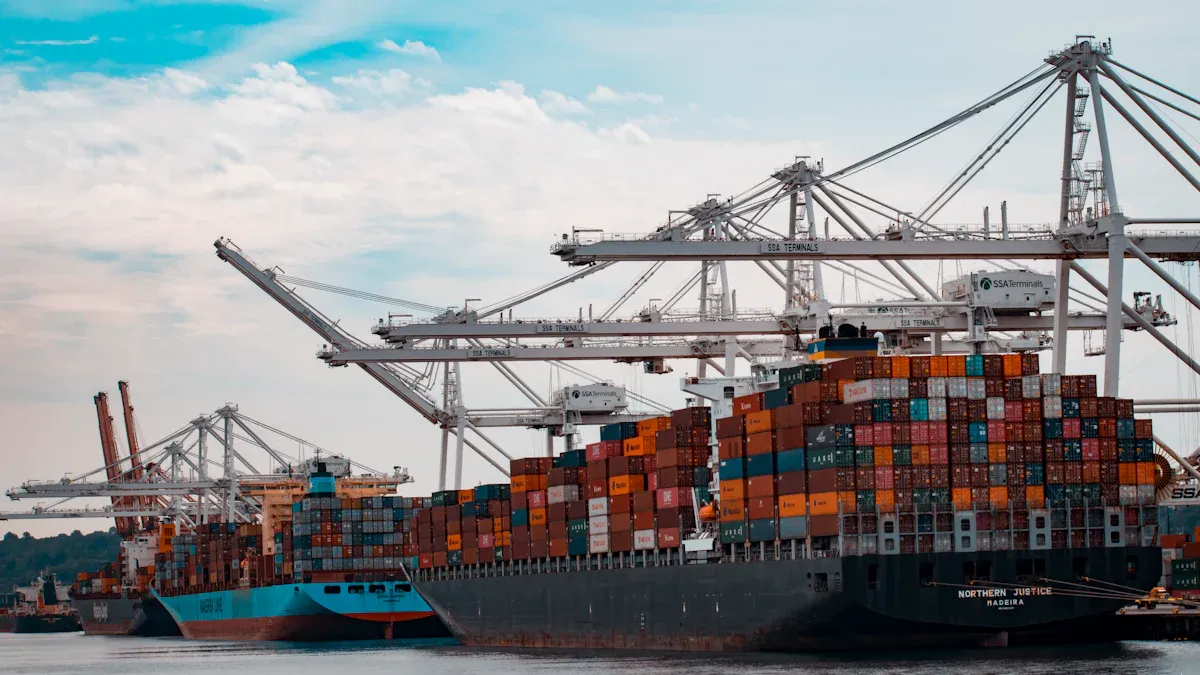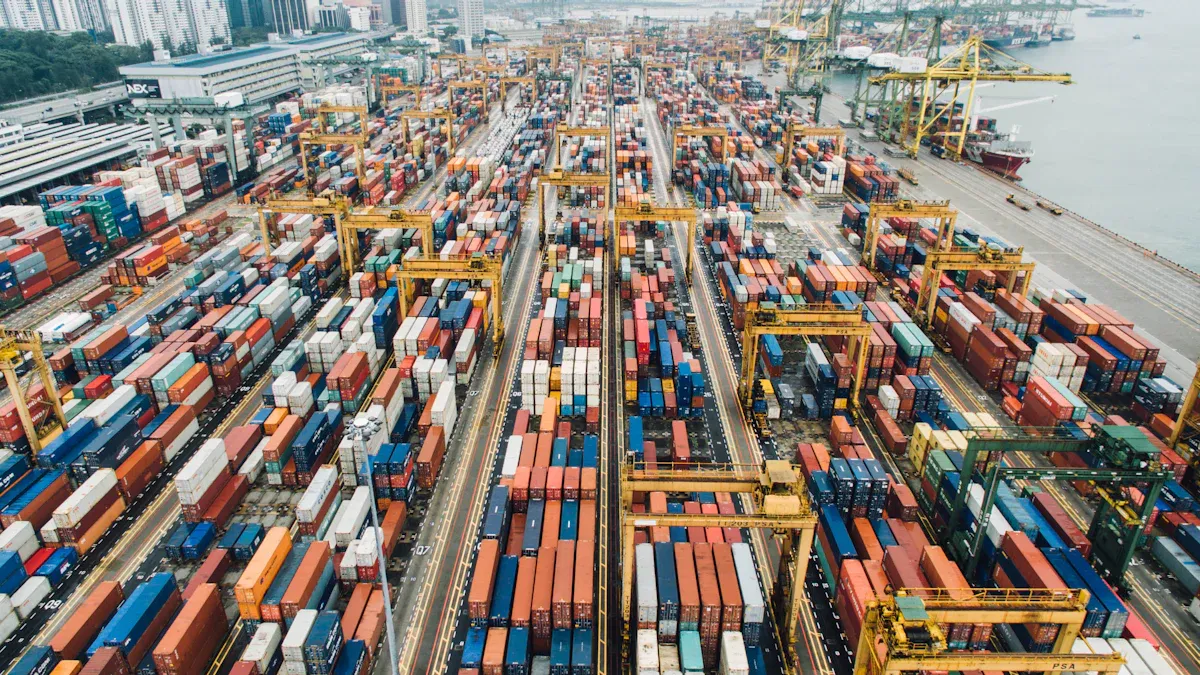What You Should Know About Import Taxes and Duties When Buying Bulk Goods from China

Importing from China involves navigating complex import taxes and duties, which can be particularly relevant for flashlight wholesale distributors. These costs can significantly impact your business, especially with tariffs on certain goods reaching up to 25%. Hidden fees, such as storage charges or customs exams, often arise unexpectedly. Staying informed about duty rates and regulations ensures smoother operations and protects your bottom line.
Key Takeaways
Learn about import taxes to avoid surprise expenses. These costs can affect your profits, especially with large orders.
Use HTS codes properly for correct tax calculations. Wrong codes may cause fines and slow down customs checks.
Work with customs brokers to make importing easier. They can guide you through rules and save time and money.
Understanding Import Taxes and Duties

What Are Import Taxes and Duties?
When you import goods from China, you must account for import taxes and duties. These are indirect costs imposed by customs authorities on imported products. Import taxes, often referred to as customs duties, are calculated based on the value of the goods. This value includes the cost of the product, insurance, and freight charges. For example, electronic goods with HS Codes 9003–9006 attract a 6% duty for commercial use. Clothing items with FOB prices exceeding $5,000 may incur a 27% duty, along with additional state taxes.
The customs value, filed on CBP Form 7501, includes the transaction value, which combines the CIF price and inland freight charges. Understanding these calculations ensures you can estimate costs accurately and avoid surprises.
Why Import Taxes and Duties Matter for Bulk Purchases
Import taxes and duties significantly impact your bottom line, especially when buying in bulk. Bulk shipments often have higher declared values, leading to increased duty rates. For instance, tariffs on goods central to the "Made in China 2025" initiative reached 25% during Stage 1 of tariff implementation. These costs can quickly add up, reducing your profit margins.
Additionally, bulk imports may face stricter customs scrutiny. Misclassifying goods or underreporting their value can result in penalties. By understanding the tax and duty structure, you can plan better and ensure compliance with customs regulations.
Key Differences Between Taxes, Duties, and Tariffs
Taxes, duties, and tariffs serve different purposes in international trade. Duties depend on product characteristics, such as the HTS code and certificate of origin. Tariffs, on the other hand, are fees applied to specific products from certain countries, often as a result of trade negotiations. Import taxes, like VAT or GST, are fixed rates calculated based on the total value of the imported goods.
A common misconception is that customs duty is the only cost you’ll face. In reality, additional taxes like VAT or excise tax may also apply, depending on the destination country. These taxes are usually calculated as a percentage of the customs value plus the duty. Understanding these distinctions helps you prepare for all potential costs.
Calculating and Managing Import Taxes and Duties
The Role of HTS Codes in Importing from China
HTS codes play a critical role in determining the import taxes and duties you owe. These codes, assigned by U.S. Customs, classify every product entering the country. The Harmonized Tariff Schedule (HTS) code is a 10-digit identifier that specifies the applicable tariff rate for your goods. Correctly classifying your products ensures accurate duty calculations and prevents costly misclassification penalties.
HTS codes are part of the Harmonized System, an international standard for product classification. This system allows customs authorities to document imports consistently. For example:
HTS codes determine the duty rate for your goods.
Misclassification can lead to delays or fines.
Accurate classification simplifies customs clearance.
How to Determine Duty Rates for Your Products
Determining duty rates involves several steps. First, check if your product has an additional duty rate, such as the extra 25% imposed during the trade war. Next, calculate the customs duty using the HTS code and the value of your shipment. Imported goods valued at $800 or more are subject to duties, while shipments below this threshold are duty-free.
To ensure accuracy:
Verify all documentation, including the commercial invoice and packing list.
Consult a customs broker to navigate complex regulations.
Familiarize yourself with applicable taxes and duties for your products.
Every shipment undergoes an entry summary process, starting with customs form submission and ending with duty payment. Proper preparation ensures smooth processing.
Customs Bonds and Their Importance in Bulk Imports
When importing in bulk, customs bonds become essential. A customs bond acts as a financial guarantee that you will pay all duties, taxes, and fees associated with your shipment. Without a bond, customs may hold your goods, causing delays and additional costs.
There are two main types of customs bonds:
Single-entry bonds: Suitable for one-time shipments.
Continuous bonds: Ideal for frequent importers, covering multiple shipments over a year.
Choosing the right bond type depends on your import frequency and shipment value. For bulk imports, a continuous bond often proves more cost-effective.
Tools for Accurate Cost Estimation
Accurate cost estimation tools help you plan your imports effectively. The Freightos Import Duty & Custom Duty Calculator is a reliable option. It estimates customs clearance costs, including duties and fees. However, consulting a customs broker remains essential for precise calculations.
Remember, import duty is just one part of the total cost. Other taxes, such as VAT or GST, may apply depending on the destination country. Including all applicable taxes in your calculations ensures a realistic estimate of your total import costs.
Strategies to Reduce Import Taxes and Duties
Leveraging Free Trade Agreements and Tariff Exemptions
Free trade agreements (FTAs) and tariff exemptions can significantly reduce your import costs. These agreements eliminate or lower duties on goods traded between member countries. For example, the ASEAN-China Free Trade Area offers reduced tariffs for eligible products. To benefit, you must ensure your goods meet the rules of origin requirements and provide the necessary documentation, such as a certificate of origin.
Some products may also qualify for tariff exemptions under specific trade policies. Researching these opportunities can help you identify cost-saving options. Staying updated on trade agreements relevant to your industry ensures you maximize these benefits.
Using Customs Brokers for Streamlined Importing
Customs brokers simplify the importing process and help you avoid costly mistakes. They offer several advantages:
Streamlined Import Process: Brokers handle customs clearance efficiently, preventing delays.
Compliance and Risk Management: They ensure your shipments adhere to regulations, reducing penalties.
Cost Savings: Brokers calculate duties accurately and identify exemptions to minimize fees.
Partnering with a customs broker ensures your imports proceed smoothly, saving you time and money.
Exploring Alternative Fulfillment Options Like Hong Kong
Using Hong Kong as a fulfillment hub offers unique advantages. Hong Kong operates as a duty-free port, allowing you to import goods without incurring duties or taxes. This can lead to significant cost savings, especially for e-commerce businesses.
Additional benefits include:
Faster restocking through efficient logistics, such as trucking from China to Hong Kong in just two days.
The ability to ship globally without additional duties or taxes.
No need to register a company in Hong Kong to use its fulfillment centers.
This strategy reduces your overall shipping costs and improves operational efficiency.
Negotiating with Suppliers for Cost Savings
Negotiating effectively with suppliers can lower your import-related expenses. Highlight the value of a long-term partnership and emphasize future business opportunities. Offering alternative incentives, such as faster payment terms or bulk purchasing commitments, can also encourage suppliers to reduce prices.
Leverage market research to demonstrate your knowledge of industry trends and competitor pricing. This positions you as an informed buyer and strengthens your negotiating power. By building strong supplier relationships, you can secure better terms and reduce your overall costs.
Common Challenges and Solutions
Misclassified Goods and Incorrect HTS Codes
Misclassifying goods or using incorrect HTS codes can lead to serious consequences. Customs authorities may impose excessive fines, reject shipments, or require lengthy refund procedures. These issues often arise due to:
Lack of familiarity with product classifications.
Errors in documentation provided by suppliers.
Misinterpretation of HTS code descriptions.
To avoid these problems, you should verify HTS codes with a customs broker or use online classification tools. Providing accurate product descriptions and consulting experts ensures proper classification, reducing the risk of penalties and delays.
Delays and Additional Fees at Customs
Customs clearance can be a time-consuming process, especially for bulk shipments. Extensive documentation, such as bills of lading and customs declarations, is required. Misdeclaring or undervaluing goods often results in delays and unexpected fees, including storage or inspection costs.
To minimize these risks, ensure all paperwork is complete and accurate. Partnering with a customs broker can streamline the process and help you navigate complex regulations. Additionally, maintaining open communication with your supplier ensures timely submission of required documents.
Ensuring Compliance with Import Regulations
Compliance with import regulations is critical to avoid fines and shipment rejections. Key requirements include:
Suppliers must provide detailed customs declarations, including shipment value and product categories.
Necessary export licenses, such as business and export licenses, must be secured.
Labeling must meet U.S. standards, including the manufacturer's name and country of origin.
You should also adhere to product-specific regulations, such as safety standards for electronics or environmental restrictions on hazardous substances. Accurate labeling and respecting intellectual property rights further ensure compliance.
Avoiding Penalties for Misreporting
Misreporting import information can result in severe penalties. Customs authorities may impose fines based on the severity of the violation:
Fraud: Maximum penalty equals the domestic value of the merchandise.
Gross Negligence: Penalty is the lesser of the domestic value or four times the loss of duties.
Negligence: Penalty is the lesser of the domestic value or two times the loss of duties.
To avoid these penalties, exercise reasonable care when preparing documentation. Filing prior disclosures before investigations begin can mitigate risks. Seeking legal advice ensures your submissions comply with customs regulations.
By addressing these challenges proactively, you can streamline your importing process and protect your business from unnecessary costs.
Tips for Flashlight Wholesale Distributors

Managing Import Costs for Flashlights
Managing costs effectively is crucial for flashlight wholesale distributors importing from China. Several factors influence your overall expenses. The table below outlines the primary cost components you should consider:
Cost Factor | Description |
|---|---|
Shipping and logistics | Costs for transporting products to the U.S., including warehouse storage and transportation methods. |
Customs bonds | Required for all items entering the U.S. to cover duties and taxes. |
Insurance requirements | Necessary to protect goods during transit, often involving cargo insurance. |
Additional costs such as website maintenance and marketing for selling products. |
To reduce costs, optimize your shipping strategy by consolidating shipments or choosing cost-effective carriers. Evaluate your insurance needs carefully to avoid overpaying while ensuring adequate coverage. Additionally, maintaining accurate records of customs bonds and operational expenses will help you track and manage your budget efficiently.
Compliance Tips for Flashlight Wholesale Distributors
Compliance with regulations is essential to avoid penalties and maintain consumer trust. As a flashlight wholesale distributor, you must adhere to the following guidelines:
Follow safety standards to prevent overheating, battery failures, and electrical shocks.
Ensure compliance with ANSI/NEMA FL1 and UL Listing standards for reliability and product safety.
Avoid non-compliance, as it can result in legal penalties, fines, and liability lawsuits.
By prioritizing compliance, you protect your business from financial losses and enhance your reputation in the market. Regularly review regulatory updates and work with suppliers who meet these standards to ensure your products remain compliant.
Exploring Cost-Effective Shipping Options
Shipping plays a significant role in your overall expenses. To minimize costs, explore options that align with your business needs. For example, consider using freight forwarders to negotiate better rates or opting for consolidated shipping to reduce per-unit costs.
You can also evaluate different shipping methods, such as sea freight for bulk orders or air freight for urgent deliveries. Each method has its advantages, so choose based on your timeline and budget. Additionally, partnering with reliable carriers ensures timely delivery and reduces the risk of delays.
Efficient shipping strategies not only save money but also improve customer satisfaction by ensuring products arrive on time.
Importing from China requires careful planning and execution. To streamline your process:
Develop a robust import strategy and identify reliable suppliers.
Ensure compliance with export regulations and obtain accurate documentation.
Engage a digital freight forwarder to simplify logistics.
Conduct due diligence and implement quality control measures.
Accurate declarations ensure smooth customs processing and help avoid unnecessary costs.
By following these steps, you can reduce expenses and achieve a cost-effective importing experience.
FAQ
What documents do you need to import goods from China?
You need a commercial invoice, packing list, bill of lading, and customs declaration. A customs bond and certificate of origin may also be required.
How can you avoid delays at customs?
Ensure accurate documentation, classify goods correctly using HTS codes, and partner with a customs broker. Timely submission of paperwork also prevents unnecessary delays.
Are there exemptions for small shipments?
Yes, shipments valued under $800 (de minimis threshold) are duty-free in the U.S. However, this exemption does not apply to restricted or regulated goods.
Tip: Always verify the latest import regulations to avoid unexpected issues.
See Also
Comprehensive Tips for Purchasing Wholesale Flashlights from China
The Definitive Handbook for Bulk Purchasing Flashlights Wholesale
Discovering Budget-Friendly Bulk Flashlights: An In-Depth Guide
Navigating Quality Criteria for LED Flashlights from China Suppliers
Strategies for Acquiring Premium Flashlights for Your Import Business
